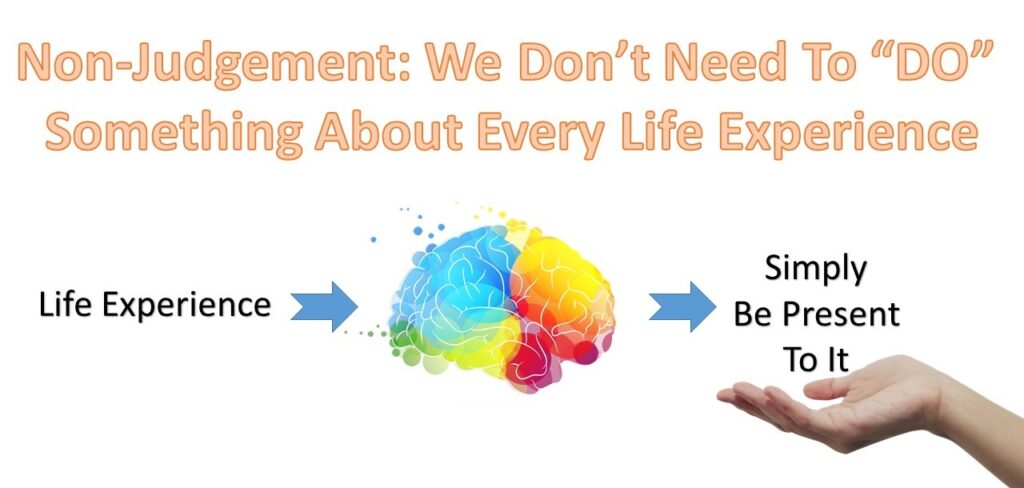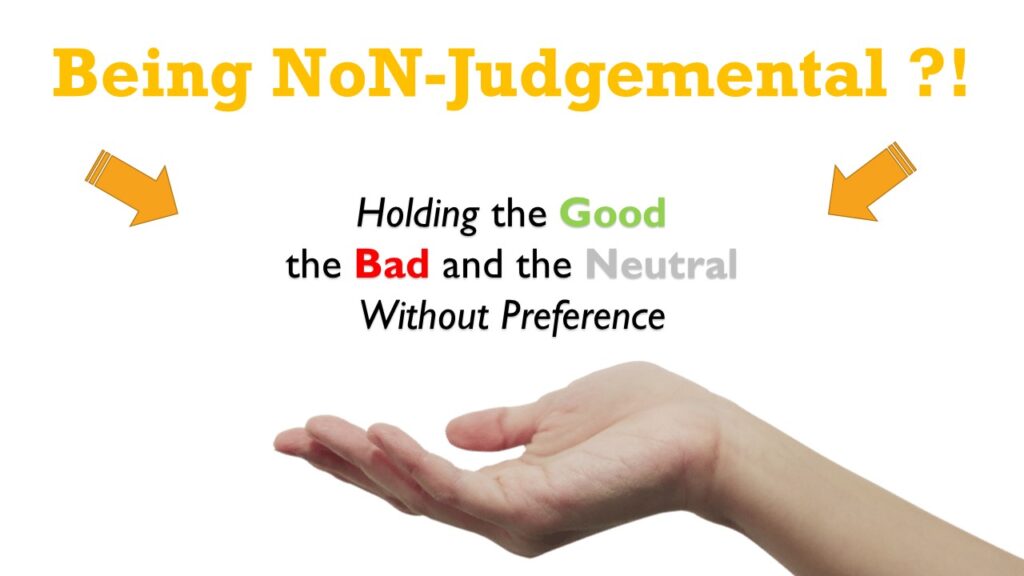In our previous post on being “non-judgemental”, we looked at the workings of the “judging mind” and how an overtly judgemental mind can be very taxing and controlling and can leave you feeling stuck in life. Meditation, through the cultivation of mindfulness, presents an alternative to such a mode of existence through the application of an all-encompassing non-judgemental awareness (Kornfield, 2008).
This points us to what is probably one of the most popular definitions of mindfulness that of Jon Kabat-Zinn (1994), “mindfulness means paying attention in a particular way: on purpose, in the present moment, and without judgment” (p. 4). But before we delve into the specifics of cultivating mindfulness, we need to ask ourselves what is it to be “non-judgemental”? What is this all-encompassing non-judgemental awareness? And what does it mean to be non-judgemental?
Being non-judgemental
Being non-judgemental is to cultivate what we could call a “respectful awareness” by trying to let go of our automatic judgements, which naturally arise in our mind as a consequence of our daily experiences. This does not mean being indifferent or callousness. On the contrary.
Reflect being indifferent or callous is contrary to being non-judgemental because although at first saying to yourself, “it does not matter that such or such a thing happens as everything and every experience is transitory”, might give you a certain sense of relief.
With time such an approach towards life can be very harmful because what you are actually doing is not being non-judgemental but withdrawing from and not engaging with your life experiences and how these might make you feel.
This is what indifference is, which has its basis in “fear” contrary to what being non-judgemental is.
To be non-judgemental requires courage
Being non-judgemental requires courage because it means making space within the mind to allow yourself the privilege to experience the full range of your thoughts, feelings and emotions. Even if at times they might be challenging or upsetting.
This requires a balanced engagement with all aspects of your life. This is far from being passive or indifferent. It’s the total opposite it is opening up to the whole of your lived experience with composure and ease of mind no matter what life throws at you. It’s about acknowledging and embracing the beautiful and terrifying nature of life’s every uncertainty and all that can be with a clarity of perception.
With such “clarity of perception,” you start to engage with both the agreeable and the disagreeable, the loved and unloved, the pleasure and pain, the joy and the fear, the sadness and happiness, and all the other opposing realities of life. With neither preference for one or the other but a balanced engagement with both. Such state of being could bring with it great peace and joy as you are no longer trying to avoid what you consider bad and chasing after what you perceive as good while ignoring the neutral.
Instead, you start approaching whatever life throws at you with an internal sense of serenity.
It is not tied to doing
This could be described as a state of not being tied to a mindset that has to do something whatever arises. Reflect whenever we experience something outside of us it’s as if we automatically feel we have to “react to it”, “to do something about it”.
Sometimes there actually might be nothing to be done about the present moment. Because of this, we might get a sense that we are losing control over our life. This might leave us feeling helpless so we might end up constantly running away from present experience.
On the contrary, whenever our experience confirms our want’s and need’s, we end up grasping onto them, trying not to lose them. Such that we might end up on a hedonistic treadmill, of avoiding the bad, continually looking out for the next good thing, grasping and clinging onto anything we perceive will bring us happiness.
Locked in an ever ending cycle of grasping onto, resisting or ignoring of life experiences.
Non-judgemental and “being”
A non-judgemental state goes beyond this; there is no grasping, no resistance or ignoring of life experiences. It’s a non-reactive state of being where you open up entirely to your lived experiences resting within them with an embodied presence – “mind resting within the body, body and mind here now together” – a state of non-duality with experience.

Where there is no longer a “me” – “this experience in relation to me” – but “I”. Or what has been called “Atman”, “Mind of Christ” or “Buddha” (Wilber, 1996). Such that there is an “I”, an “I” that experiences or an experiencing “I” or the perceiver that sees. A shift from what is called doing to a being mode of experiencing (Narin, et al., 2019).
By shifting into a “being mode”, we bring awareness into the reality that the present moment is whole as it is.
But you might argue that this “non-doing” or “just-being” is a non-judgemental state of existence where there is no thoughts or actions and judgements.
Going beyond our judgements
On the contrary, being Non-judgemental is not about stopping judgments from ever arising—that’s impossible. It’s the nature of the mind to judge. It’s the capacity to go beyond such judgements to see what is actually unfolding by not judging it. It could be likened to a spiritual exercise of recognising and understanding our relationship to our experiences by cultivating a very fine degree of discernment, clarity, and the wisdom of understanding the interconnections between things and how this might give rise to our thoughts, feelings and automatic tendency to judge quickly (Hadot, 2016; Narin, et al., 2019).
It’s about changing our relationship with our judgements. By acknowledging that they’re fleeting thoughts, which create a kind of veil or the filter in front of our eyes. Realising that you don’t need to be swept away by them just because they arise in our mind.
Reflect, being swept away by them does not allow us to see things as they are. We would actually be seeing them through the coloured glasses of our own ideas, opinions, likes and dislikes which at times can be blinding.
Seeing things as they are
So we could compare being non-judgemental to the beautiful discipline of the cultivation of awareness of judging. This through the act of being compassionate with oneself by acknowledging, pausing and not judging the judging and the judge that we might discover in ourselves doing the judging, just an acknowledging. To this Kristin Neff (2011) brings the notion that being non-judgemental is:
“To see things as they are, no more, no less, in order to respond to our current situation in the most compassionate—and therefore effective—manner”.
Kristin Neff (2011, p. 73)
Practising this over time, we begin to find our own way in how to navigate through our judging so that they no longer dominate our lives quite in the same way as they use to.
With time you will start to notice that being non-judgemental eliminates clinging or aversion to both positive and negative outcomes. Instead, it sees the possibility of both and none. While at the same time adopting an ethic of compassion. The ethic of recognizing suffering in oneself and others, with a deep motivation to do something to relieve it (Gilbert & Choden, 2014).
Such that the more we practice this all-encompassing non-judgemental awareness, the more we start to live life authentically, in the present moment, without getting caught up in our own habits of mind.
References
Gilbert, P., & Choden. (2014). Mindful compassion. Oakland, CA: New Harbinger Publications.
Hadot, P. (2016). Philosophy as a way of life: Spiritual exercises from Socrates to Foucault. (A. Davidson, Ed., & M. Chase, Trans.) Oxford: John Wiley & Sons Ltd.
Kabat-Zinn, J. (1994). Wherever you go, there you are. New York, NY: Hyperion.
Kornfield, J. (2008). The wise heart: A guide to the universal teachings of Buddhist psychology [epub]. United States: Bantam.
Narin, R., Choden, & Regan-Addis, H. (2019). From mindfulness to insight: Meditations to release your habitual thinking and activate your inherent wisdom. Boston, MA: Shambala Publications Inc.
Neff, K. (2011). Self compassion: The proven power of being kind to yourself. New York, NY: HarperCollins Publishers Inc.
Wilber, K. (1996). The atman project: A transpersonal view of human development. Wheaton, IL: Quest Books.

